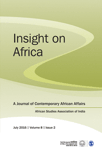
Insight on Africa
Scope & Guideline
Illuminating Africa's Multidisciplinary Narratives
Introduction
Aims and Scopes
- Political and Economic Development:
The journal emphasizes research on the political and economic landscapes of African nations, exploring how state institutions, governance models, and economic policies shape development outcomes. - Social Issues and Human Rights:
A significant area of focus is the examination of social issues, including gender equality, migration, xenophobia, and human rights, highlighting the lived experiences of individuals and communities across Africa. - International Relations and Global Influence:
The journal investigates Africa's role in international relations, including bilateral relations, foreign aid, and geopolitical strategies, analyzing how global dynamics impact the continent. - Cultural and Historical Perspectives:
The exploration of cultural identities, historical narratives, and their influence on contemporary African societies is a recurring theme, offering insights into the complexities of African heritage. - Environmental Sustainability and Resource Management:
Research on environmental challenges, sustainability practices, and the impact of climate change in Africa is increasingly relevant, reflecting the continent's unique vulnerabilities and adaptive strategies.
Trending and Emerging
- Impact of Globalization on Local Economies:
There is a growing interest in how globalization affects local economies in Africa, particularly in the context of trade policies and foreign direct investment, highlighting the complexities of economic interdependence. - Gender and Intersectionality in Development:
An increasing focus on gender studies, particularly intersectional approaches to women's roles in politics and development, reflects a broader commitment to understanding diverse experiences and advocating for social justice. - Environmental Challenges and Renewable Energy:
Research into environmental sustainability, particularly renewable energy solutions like off-grid solar electrification, is on the rise, addressing urgent climate challenges faced by the continent. - Violent Extremism and Local Conflicts:
The analysis of violent extremism and its relationship with local conflicts is trending, indicating a need for nuanced understanding of security issues in regions affected by instability. - Cultural Diplomacy and Soft Power:
Emerging themes around cultural diplomacy and its role in international relations demonstrate an interest in how cultural narratives shape political and economic interactions on the continent.
Declining or Waning
- Post-colonial Studies:
Research focusing on post-colonial critiques and the legacy of colonialism in African contexts appears to be declining, possibly overshadowed by more pressing contemporary issues such as economic development and governance. - Traditional Security Studies:
While security remains a crucial topic, traditional analyses of military and state-centric security are less frequent, as newer frameworks emphasizing human security and socio-economic factors gain traction. - Regional Integration Theories:
Studies specifically addressing regional integration through theoretical lenses are becoming less common, with a shift towards empirical analyses of trade and economic cooperation instead.
Similar Journals
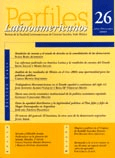
Perfiles Latinoamericanos
Pioneering Research for a Deeper Understanding of Latin AmericaPerfiles Latinoamericanos is a prominent academic journal published by FLACSO-MEXICO, dedicated to advancing scholarly discourse in the fields of Sociology and Political Science. Since its inception in 1992, this Open Access journal has made significant contributions to the understanding of Latin American societal and political dynamics, providing researchers, professionals, and students with valuable insights and analysis. With an ISSN of 0188-7653 and an E-ISSN of 2309-4982, the journal has established itself as a reliable source of knowledge, boasting a respectable Scopus rank within the 36th percentile among its peers. As of 2023, it holds a Q3 ranking in Sociology and Political Science, reflecting its commitment to maintaining rigorous academic standards and fostering impactful scholarship. Researchers can easily access its published articles, contributing to a wider dialogue on critical issues affecting the region. The journal’s coverage span from 2008 to 2024 affirms its ongoing relevance in the academic community.
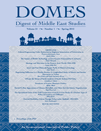
Digest of Middle East Studies
Fostering Critical Conversations on Middle Eastern IssuesDigest of Middle East Studies (ISSN: 1060-4367; E-ISSN: 1949-3606), published by WILEY, is an esteemed academic journal dedicated to the exploration and dissemination of research in the complex and multifaceted domains of Middle Eastern studies. Since its inception in 1992, the journal has provided a vital platform for scholarly discourse, addressing critical themes in cultural studies, history, law, politics, and religious studies, making it a cornerstone for researchers, professionals, and students alike. Notably, the journal's respected ranking in various Scopus categories, including Q1 in History and Religious Studies, highlights its significance and impact within these fields. While not an open-access journal, it remains an essential resource for in-depth analysis and innovative insights, contributing to a greater understanding of the socio-political and cultural dynamics of the Middle East. The journal's ongoing commitment to academic excellence assures its relevance through 2024 and beyond, fostering a robust engagement with contemporary issues and historical narratives.

INTERNATIONAL JOURNAL OF AFRICAN HISTORICAL STUDIES
Uncovering Diverse Perspectives in African Historical ResearchInternational Journal of African Historical Studies is a leading academic journal published by the African Studies Center at Boston University. With its ISSN 0361-7882 and E-ISSN 2326-3016, this journal serves as a vital platform for scholarly discourse in the fields of History, Cultural Studies, and Sociology. Renowned for its rigorous peer-reviewed research, the journal holds a commendable Q1 ranking in History and Q2 in Cultural Studies as of 2023, highlighting its influence and contribution to African historical scholarship. The journal has been published since 1976, consistently providing insightful analyses and critical research that engage with Africa's past and present, thereby enriching our understanding of global histories. Although it does not offer an open-access model, the journal is accessible through various academic databases and institutions. Its mission is to foster a deeper understanding of African histories by publishing high-quality, innovative research that reflects diverse perspectives, making it an essential resource for researchers, professionals, and students dedicated to the study of African history and cultural dynamics.
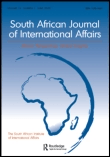
South African Journal of International Affairs-SAJIA
Exploring Africa's Role in Global AffairsThe South African Journal of International Affairs (SAJIA), published by Routledge Journals under Taylor & Francis Ltd, is a leading academic publication dedicated to advancing the study of political science and international relations within the African context. Since its inception in 1993, SAJIA has distinguished itself in the academic community, achieving a Q3 ranking in 2023 among its peers, reflecting its commitment to high-quality research and scholarly discourse. With a current Scopus rank of #285 out of 706 within its field, SAJIA provides a platform for researchers, professionals, and students to engage with contemporary global issues, particularly those pertinent to Africa and its interactions on the world stage. Although it does not operate on an open access model, the journal's rigorous peer-review process ensures that published articles contribute significantly to the academic corpus. The journal's scope encompasses a wide array of topics, positioning it as an essential resource for anyone interested in the dynamics of international affairs.

Annee du Maghreb
Unveiling the Complexities of Mediterranean SocietiesAnnée du Maghreb, published by CNRS Éditions, is an esteemed open-access journal dedicated to advancing the study of Mediterranean and North African cultures, history, and societies. Since its inception in 2004, the journal has aimed to foster a deeper understanding of the complex socio-political dynamics, artistic expressions, and historical contexts of the Maghreb region. By providing a platform for rigorous research and interdisciplinary dialogue, Année du Maghreb plays a pivotal role in enriching academic discourse and enhancing knowledge within the fields of anthropology, history, and cultural studies. Accessible to a global audience, this journal invites researchers, professionals, and students to contribute to its growing repository of scholarly work, ensuring the continuation of high-quality discussions pertinent to this vibrant area of study.

JOURNAL OF MODERN AFRICAN STUDIES
Bridging Disciplines to Decode Africa's Modern RealitiesJOURNAL OF MODERN AFRICAN STUDIES, published by CAMBRIDGE UNIV PRESS, is a premier academic journal that has been a cornerstone for interdisciplinary research on contemporary issues facing Africa since its inception in 1963. With an ISSN of 0022-278X and an E-ISSN of 1469-7777, this journal plays a critical role in shaping the discourse around African studies, encompassing vital topics in Geography, Planning and Development and Sociology and Political Science. The journal holds a commendable Q2 quartile ranking in both fields, indicating its solid reputation and influence, with Scopus ranks reflecting its academic impact within the top echelons of social sciences. The journal’s commitment to quality scholarship aims to foster a deeper understanding of socio-political dynamics, cultural transformations, and economic developments across the continent. While it does not offer open access, its rigorous peer-review process ensures that contributions are impactful and relevant to researchers, professionals, and students alike. The JOURNAL OF MODERN AFRICAN STUDIES continues to be essential reading for anyone engaged in the ever-evolving narratives of modern Africa.
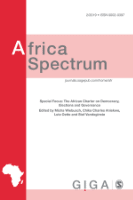
Africa Spectrum
Empowering Voices in African ResearchAfrica Spectrum, published by SAGE Publications Inc, is a prominent journal dedicated to the exploration of African studies, focusing on cultural, political, and developmental issues within the continent. With its ISSN 0002-0397 and E-ISSN 1868-6869, the journal has garnered a significant reputation, boasting a remarkable impact factor within the Q1 category across various fields, including Cultural Studies, Political Science and International Relations, and Sociology. Since adopting an Open Access model in 2009, Africa Spectrum has made cutting-edge research widely available, fostering scholarly communication and collaboration among researchers, professionals, and students. The journal's diverse scope spans critical analyses of contemporary societal challenges and transformative developments, proving indispensable for those engaged in understanding and addressing the complexities of African contexts. Located in Germany, Africa Spectrum serves as a vital platform for high-quality research that shapes discourses around the African continent and its global interactions, making it an essential resource for anyone invested in the continent's future.

Codrul Cosminului
Fostering Academic Excellence Across DisciplinesCodrul Cosminului, published by Stefan cel Mare University in Romania, is an esteemed open-access journal that has been facilitating scholarly discourse since 2004. With an ISSN of 1224-032X and an E-ISSN of 2067-5860, it plays a crucial role in the fields of Cultural Studies, History, Political Science, International Relations, and Religious Studies. The journal’s impact is evidenced by its 2023 categorization in Q2 for multiple disciplines, marking it as a reputable platform for researchers. This interdisciplinary journal serves as a vital resource for academics and practitioners alike, encouraging contributions that explore diverse cultural and historical narratives. The Scopus rankings further illustrate its relevance, positioning it within influential tiers across its fields. Researchers and students will find Codrul Cosminului invaluable for accessing high-quality, peer-reviewed content that enhances their understanding of complex societal and cultural dynamics.

Mirovaya Ekonomika i Mezhdunarodnye Otnosheniya
Bridging Disciplines: Economics Meets International RelationsMirovaya Ekonomika i Mezhdunarodnye Otnosheniya, with the ISSN 0131-2227 and published by NAUKA PUBLISHING HOUSE, serves as a premier platform for the dissemination of research in the fields of economics and international relations, reflecting its commitment to academic excellence in the Russian Federation. With an impressive trajectory from 2015 to 2024, this journal is currently categorized as Q3 in Economics and Econometrics and Q2 in Political Science and International Relations, highlighting its growing influence and recognition within the academic community. Although the journal does not operate under an open access model, it provides valuable insights and rigorous analyses addressing contemporary global economic issues and international dynamics, making it an essential resource for researchers, professionals, and students alike. The Scopus rankings further position it as a relevant publication, underscoring its engagement with significant disciplinary debates and frameworks in both economics and political science.

Revista UNISCI
Championing Research and Insight in International RelationsRevista UNISCI is a distinguished open-access journal published by UNIV COMPLUTENSE MADRID, SERVICIO PUBLICACIONES, dedicated to advancing the discourse in the fields of Political Science and International Relations. Since its inception in 2005, it has established a platform for emerging scholars and seasoned researchers alike to share innovative ideas and findings. With an E-ISSN of 2386-9453, Revista UNISCI is accessible to a global audience, facilitating knowledge dissemination in an increasingly interconnected world. The journal has been categorized in Q4 quartile for 2023, highlighting its relevance in the competitive landscape of academic publishing, while its Scopus rank of 566 out of 706 positions it among the prominent voices in the discipline. As the journal enters its converged years from 2015 to 2024, it aims to foster interdisciplinary dialogue and contribute to ongoing research debates, ultimately enriching the academic community’s understanding of critical global issues.